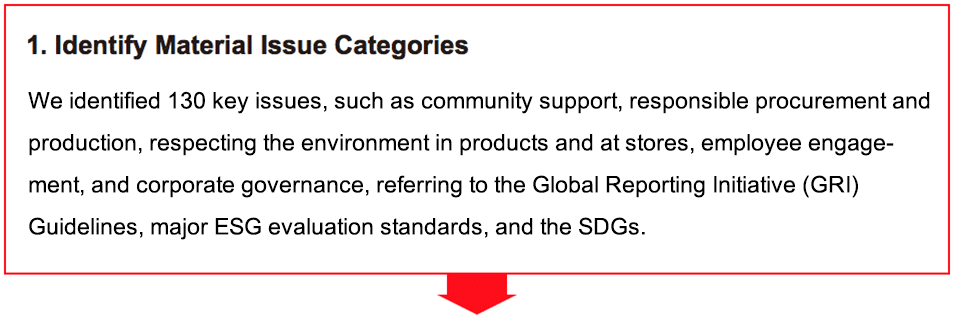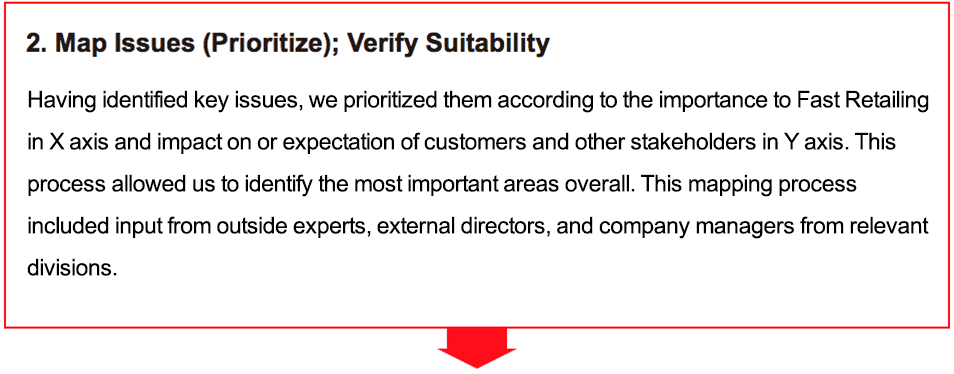Last Updated: 2024.02.29
to Japanese page
Materiality Assessment as Management Strategy
At the Fast Retailing Group, our vision is to become the world's No.1 digital consumer retail company. We cannot achieve our vision in good conscience unless we ensure sustainable business practices from an environmental and social point of view. As one part of our management strategy, we defined six key issues (materialities), and are setting goals to address each of them.
The Materiality Assessment Process at Fast Retailing
We used a four-step approach to conduct a materiality assessment, identifying key issues for the Fast Retailing Group.
In conducting our materiality assessment, we identified key issues based on the UN Sustainable Development Goals (SDGs), and indicators recommended by Environmental, Social, Governance (ESG) investment firms. We prioritized these according to relevance at Fast Retailing, and the impact on, or expectation of, customers and other stakeholders, before deliberating at the Sustainability Committee.




Six Materialities
We selected six materialities under which we conduct our sustainability activities.
![]() 1. Create New Value Through Products and Services
1. Create New Value Through Products and Services
![]() 2. Respect Human Rights in Our Supply Chain
2. Respect Human Rights in Our Supply Chain
![]() 3. Respect the Environment
3. Respect the Environment
![]() 4. Strengthen Communities
4. Strengthen Communities
![]() 5. Support Employee Fulfillment
5. Support Employee Fulfillment
![]() 6. Corporate Governance
6. Corporate Governance
 1. Create New Value Through Products and Services
1. Create New Value Through Products and Services
Among the tenets of the Fast Retailing Way (Group Corporate Philosophy) is the commitment "to create truly great clothing with new and unique value, and to enable people all over the world to experience the joy, happiness and satisfaction of wearing such great clothes."
UNIQLO, the main brand of the Fast Retailing Group, operates under the concept of LifeWear. Under this concept, we deliver products that make life more comfortable for all people. Our innovative product development, strong business partnerships, and large-scale store network has established UNIQLO as a unique brand in the apparel industry. We are expected to go beyond simply improving the functionality and quality of clothing, to provide solutions to social and environmental challenges, and to create new forms of value. We must, for example, adopt more environmentally conscious manufacturing practices and source materials ethically, including caring for animal welfare, the environment, and farmworker living conditions. We believe that through various sustainability initiatives, our customers will feel a greater sense of reassurance and peace of mind. We also believe that by collecting clothes that our customers no longer use and donating these to refugees and internally displaced persons, we are helping to bring the joy and happiness of wearing clothes to more people. Fast Retailing will continue to work towards a better society by creating new value through our business.
 2. Respect Human Rights in Our Supply Chain
2. Respect Human Rights in Our Supply Chain
We respect the basic human rights of all people who work in our supply chain. One of our most important duties is to protect the physical and mental health, as well as the security and safety, of these people. Our partner factories know that we will not tolerate any violation of human rights (child labor, forced labor, harassment, discrimination, physical abuse, etc.). In addition, mechanisms are in place to ensure strict compliance. Fast Retailing asks partner factories to comply with our Code of Conduct for Production Partners, which is based on the core labor standards of the International Labour Organization. We will fulfill our responsibilities in this area, aligned with the UN Guiding Principles on Business and Human Rights and other international human rights principles and declarations.
 3. Respect the Environment
3. Respect the Environment
Fast Retailing works to eliminate waste in our business operations and across our supply chain, striving for the effective use of resources. As we reduce our environmental impacts, we also adopt innovative technologies to support a more sustainable way of doing business. Fast Retailing will focus on six environmental areas:
- Address climate change
- Improve energy efficiency
- Address biodiversity
- Manage water resources
- Manage chemical substances
- Improve waste management and resource efficiency
 4. Strengthen Communities
4. Strengthen Communities
Today, the world faces many social challenges -such as increasing burden on the environment, poverty, a refugee crisis, racial discrimination, terrorism, regional conflict, and more. Fast Retailing is committed to helping solve such issues. As underlined in our sustainability statement, "Unlocking the Power of Clothing," we aim to grow and prosper with the communities we serve through our clothing business and are aspiring to a better society where we all thrive. We understand that the retail industry cannot thrive without stable economic and social conditions in each community. The same goes for our manufacturing bases. Fast Retailing strives to support our communities, using our stores, people, products, and expertise to make a difference.
 5. Support Employee Fulfillment
5. Support Employee Fulfillment
Our business success depends on our people. The Fast Retailing Way (Group Corporate Philosophy) highlights the values shared by all employees to "Respect and support individuals to foster both corporate and personal growth". As we grow as a company, each individual develops their professional skills, leading to greater enthusiasm in the workplace and personal growth. To encourage this positive cycle, we created the Employee Engagement Policy, which defines activities focusing on three major initiatives: (1) Equal opportunity and diversity; (2) Recruiting and developing people; and (3) Healthy, secure, and safe workplaces.
 6. Corporate Governance
6. Corporate Governance
The Fast Retailing Corporate Statement is "Changing clothes. Changing conventional wisdom. Change the world." Our goal is to become world's leading digital consumer retail company. At the same time, we will engage in sustainability initiatives through our business, responding to the needs of our customers, business partners, shareholders and other stakeholders as we manage our business with agility and transparency.
We are striving to build an effective corporate governance system to achieve these goals. According to Audit & Supervisory Board Member system, the majority of the Fast Retailing board of directors consists of external directors. This arrangement increases the independence of the board of directors, while also strengthening its supervisory functions. Having adopted an executive officer system, we separate the function of management decision-making from day-to-day operations to ensure timely decisions and operations. To support the functions of our board of directors, we have established the Human Resources Committee, Sustainability Committee, Disclosure Committee, IT Investment Committee, Code of Conduct Committee, Business Ethics Committee, Risk Management Committee, Nomination and Remuneration Advisory Committee and Human Rights Committee. We are holding open discussions and making decisions to achieve the respective goals of each committee.
We established the Fast Retailing Group Code of Conduct to serve as a guide for our employees to observe in practice. We continue to endeavor for the proper operation of our internal controls system, as well as to strengthen our corporate governance.